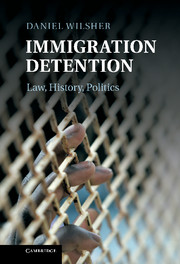Book contents
- Frontmatter
- Contents
- Acknowledgements
- Introduction and overview: free movement of persons and liberty of the person
- 1 The creation of immigration detention: from free movement to regulated borders in America and the United Kingdom
- 2 Modern immigration detention and the rise of the permanent bureaucratic enterprise
- 3 International law and immigration detention: between territorial sovereignty and emerging human rights norms
- 4 Negotiating detention within the European Union: redefining friends and enemies
- 5 Security and immigration detention: the problem of internment in peacetime
- 6 Global migration and the politics of immigration detention
- 7 Restoring the rule of law and influencing politics: placing boundaries around detention
- Bibliography
- Index
- References
3 - International law and immigration detention: between territorial sovereignty and emerging human rights norms
Published online by Cambridge University Press: 05 November 2011
- Frontmatter
- Contents
- Acknowledgements
- Introduction and overview: free movement of persons and liberty of the person
- 1 The creation of immigration detention: from free movement to regulated borders in America and the United Kingdom
- 2 Modern immigration detention and the rise of the permanent bureaucratic enterprise
- 3 International law and immigration detention: between territorial sovereignty and emerging human rights norms
- 4 Negotiating detention within the European Union: redefining friends and enemies
- 5 Security and immigration detention: the problem of internment in peacetime
- 6 Global migration and the politics of immigration detention
- 7 Restoring the rule of law and influencing politics: placing boundaries around detention
- Bibliography
- Index
- References
Summary
Introduction: sovereignty and the treatment of aliens
In this chapter we seek to explore the interaction between the development of national detention policies and international law. Until the advent of modern international human rights law, however, there was little international discussion of the issue. Since the ninteenth century, customary international law had given states a right to take action for injury to their nationals abroad, but in practice such protection was largely confined to Western diplomats or business interests. As nineteenth-century liberal cosmopolitanism, with its emphasis on the mutual benefits of free trade in labour, came under pressure, sending and receiving states began to see international obligations differently. In countries wishing to shape or curb mass migration, legal opinion began to discuss immigration control alongside war and invasion as a fundamental aspect of sovereignty. Domestic politics in receiving states gradually eclipsed the idea that there might be serious legal limitations on the treatment of friendly aliens. Diplomatic discussions over migration continued, but trailed way behind the development of border controls and enforcement apparatuses.
That states had an almost arbitrary and unlimited power over migration became an ‘accepted maxim’, at least in most common law countries. Such expressions have been repeatedly used to support alien detention as simply an inherent aspect of this legal power. James Nafziger argues, however, such broad pronouncements were misleading. Reviewing the opinions of legal scholars of the time, he concludes that the Anglo-American judgments discussed in Chapter 1 practised selective quotation. They were strongly influenced by the positivist view that, in order to be truly ‘sovereign’, law-makers within a given territory must not be subject to any external power.
- Type
- Chapter
- Information
- Immigration DetentionLaw, History, Politics, pp. 119 - 170Publisher: Cambridge University PressPrint publication year: 2011
References
- 1
- Cited by



